Before we answer that question let us quickly get to know our skin.
Skin, the largest organ of the body, defends against viruses, controls body temperature, and produces touch sensations. The epidermis, dermis, and hypodermis are the three primary layers of the skin. Acne, wrinkles, rashes, and skin cancer, are just a few of the issues that can affect the skin.
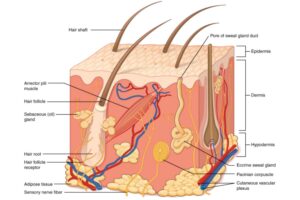
Is skincare something we all take for granted?
To answer the question, Yes, of course, most of us take skincare for granted. Many a time we do not look beyond slathering on some moisturizer, maybe or maybe not rubbing a lip balm and a lip tint, and we are out on our work.
In today’s fast-paced world where we are running short of time and where sometimes even the hours of the day seem very less, given the amount of work that we have set ourselves up to do, self-care especially skincare has taken a backseat.
By the end of the day, our skin is tired, either dry or breaking into acne, or worse, we are taking our skin towards developing more issues, like premature aging, wrinkling, and much more.
Does skincare really make a difference?
“Skincare,” the term in itself feels like a huge deal wherein you need to buy a zillion products, do this do that, intimidating to the least, due to this you would feel I am fine with my good old trusted cream or moisturizer.
Did you know each and every one of us is blessed with a skin type that is unique to us that you need to consider before deciding how and using what you will take care of your type of skin? There are primarily five skin types, namely oily, dry, combination, normal, and sensitive skin, based on which you can figure out which one is yours.
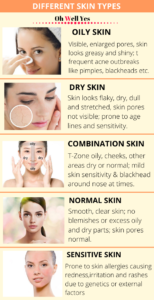
But skincare is not just buying and applying stuff but a holistic way of looking at your life. Every part of your life and the things surrounding you affect how you look externally. So yes, good skin care does make a difference on how we look, and in turn will boost our mental health.
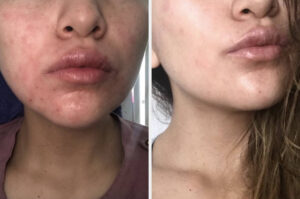
What affects our skin and how can we take care?
Mental health: Anxiety, depression, and stress cause skin conditions like acne, eczema, psoriasis, and rosacea worse.
When under emotional strain, the skin heals more slowly, making many skin issues worse and altering the immunological response through inflammation.
For example, your body produces cortisol and other stress-related hormones, which instruct your skin’s glands to produce more oil, and more oil equals to acne and other skin issues.
Unfortunately, the worse the skin condition the more it impacts our mental health. Despair not, schedule time for relaxing activities, maintain a healthy diet, meditate, get good sleep, exercise, get help from therapists, and avoid drugs and alcohol.
Food and Drinks: Eating fast food like burgers, fries, hotdogs, etc, and drinking soft drinks, energy drinks, and alcohol does give a good feeling, however, these are unhealthy as they are highly processed, fat heavy, sugar high, and damage your liver and kidneys in the long run and show up on our skin in the form of acne and other issues.
Whole foods rich in fiber from plants, and nuts, natural sugars got from fruits, good quality meats cooked with little oil, or avoiding meat altogether are immensely healthy for our body, resulting in healthy, glowing skin.
Do we need to stop eating and drinking what we love altogether? Absolutely not! There are cheat days remember! Overall, maintaining a healthy diet is the key to healthy, glowing skin.
Holidays: This is when everything goes for a toss! Binge-watching, binge eating, binge drinking, you name it and we do it! and it does show its effects on our skin
We need to try to deliberately bring out healthy food to eat, control our drinks and try to catch up on sleep and now that we have time on our hands due to the holidays, we should indulge in some self-care by doing some skincare so that by the end of the holiday season, we emerge out glowing and happy.
Pregnancy: Pregnancy is a roller-coaster ride of hormones, and as your body is going through multiple changes, your skin also goes through numerous changes. You will have the pregnancy glow or have acne, spider or varicose veins, stretch marks, dark spots, and rashes.
On top of that, anxiety, medications (if any), morning sickness, and other issues make sure we break out into a million zits.
Getting help, using relaxation techniques, maintaining a healthy diet, and meditation will help during this time.
Smoking: Smoking is the leading cause of death in the US. Smoking encourages the development of age spots and black patches, and makes the skin dull, and pale or sometimes the skin might appear grey or bluish.
The toxins released from cigarette smoke cause temporary to permanent damage to the skin cells leading to premature aging. Smoking also increases the risk of developing skin cancer called squamous cell carcinoma. The toxins in cigarette smoke decrease the ability of the skin to revive and repair wounds.
Gradually reducing the number of cigarettes you smoke will help you not experience adverse nicotine withdrawal symptoms. There are nasal sprays and inhalers to help with the withdrawal symptoms which when you overcome, you can completely stop smoking.
Pollution: Environmental pollution levels are on record high levels presently, and pollution of water, air, and food is something that is a new normal in our daily lives. Although we cannot do much about it, we can make sure that the food and water that we drink are clean, but with regard to air pollution that is something that is beyond our control.
Do men need skin care?
The androgens, a group of male sex hormones, are what cause the major difference between male and female skin.
Until puberty, when there is a significant increase, testosterone levels in children are largely steady. After puberty, males continue to produce more testosterone, which gives rise to all the features of an adult male, including the development of muscles and greater upper body strength, the growth of facial and body hair, a deeper voice, and a “manly” odour.
The gradual fall in testosterone levels that begins in middle age may be to blame for the changes in men’s skin and hair in their older years.
Due to the androgens the male skin is more supple and thick and beards provide additional protection from the sun. However, lighter-skinned men are also prone to damage from the sun as women. Additionally, studies have shown that their testosterone levels impede faster-wound healing and also affect their skin along with factors such as stress, diet, alcohol, smoking, and energy or muscle-building supplements.
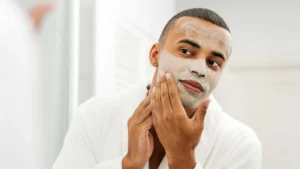
Men also have the same 5 different skin types, and they are also prone to acne and other skin-related issues, but their skincare is specially formulated keeping in mind the differences between that from a woman.
Men too need to take care of their skin and take care of their mental health, and diet as trash in equals trash out.
How about skincare for transgender persons?
The importance of the skin in developing self-harmony may be obvious for the transgender person whose misrepresentative outward appearance is the source of their internal turmoil.
Transgender people continue to overcome barriers rooted in culture and prejudice that have an immediate impact on the standard and accessibility of healthcare. They do continue to encounter unique issues of which skin-related issues are one.
Hormone replacement therapy and gender-affirming procedures for transgender persons might lead to possible skin-related adverse effects, with testosterone making the skin oilier and oestrogens making the skin dry and causing body hair loss.

Trans women face skin issues like acne, unwanted hair loss/growth, and pigmentation issues; while trans men face issues like slow, delayed, or patchy hair growth, acne caused by testosterone, extremely oily skin, and folliculitis.
Transgender people also need to take care of their mental well-being, diet, and maintaining a healthy lifestyle by exercising, yoga, and quitting smoking and/or vaping.
Transgender people need to be aware that they have skin traits that are unmistakably different from those of men and women. They need to take the advice of a dermatologist (skin doctor) for proper skin care and skin care products and not rely on social media influencers.
Can men, women, and transgender persons use each other’s skin care products?
As discussed above men, women and transgender persons have very different skins in comparison to each other. So the answer to the question is a big No.
Ingredients of skin care products, what to look for and what to avoid?
Every bottle of skin care product we have ever bought has a lengthy list of ingredients on it that we choose to ignore. If you educate yourself on what are the good ingredients and what are not you can choose for yourself whether the products you’re spending your money on are indeed the ideal ones for you rather than just relying on the names or labels.
The good ingredients to look for in skincare products are:
ALOE VERA helps reduce acne, soothe skin that has been burned, reduce signs of aging, and can heal wounds and insect bites.
ALPHA-HYDROXY ACIDS (AHAs) help with fine lines, irregular pigmentation, and age spots, brighten dull or dry skin, and can shrink enlarged pores.
AMINO ACIDS build collagen, act as an exfoliant, improve moisture retention and act as an antioxidant, good for hair and nails and reduce signs of aging.
ALLANTOIN has anti-irritating and soothing qualities
ALPHA-LIPOIC ACID has great anti-aging effects and will reduce fine lines, reduce puffiness in the face, and gives a healthy glow to the skin
ARBUTIN helps to moisturize the skin and reduce oil, promoting a smoother, clearer complexion and even helping with acne
AZELAIC ACID helps to reduce the growth of bacteria, reduces inflammation, and helps damaged skin return to its normal state, especially useful for darker-skin tone persons
BEESWAX helps keep the skin hydrated
CAFFEINE (including green tea) reduce dark, puffy circles under the eyes
CASTOR OIL protects against wrinkles and soothes the skin, it can also be used to grow hair and smooth out split ends
DIMETHICONE provides a shielding cover on skin, which helps keep moisture in, leaving skin hydrated for longer
DIMETHYLAMINOETHANOL (DMAE) will not only help reduce fine lines and wrinkles, it will also help prevent the drooping and sagging of the muscles under the skin
HYALURONIC ACID regulates cell renewal and helps to maintain the skin’s moisture and elasticity
There are some more such as: HYDROCORTISONE, HYDROQUINONE, JOJOBA, KOJIC ACID, L-ASCORBIC ACID, LACTIC ACID, MALIC ACID, MANDELIC ACID, MICA, NEUROPEPTIDES, NIACINAMIDE, OCTINOXATE, PANTHENOL, ORGANIC RED TEA EXTRACT, PEPTIDES, PHYTIC ACID, PLANT STEM CELLS, POLYENYLPHOSPHOTIDYL CHOLINE (PPC), PROBIOTICS, RESVERATROL, RETINOL, SALICYLIC ACID, SHEA BUTTER, VITAMIN A, C, D, E, K, WITCH HAZEL and ZINC OXIDE that are good ingredients helpful for the skin and its repair.
The 10 harmful ingredients that are seen in our skincare products and why we should avoid them:
PARABENS and PHTHALATES are also used in some fragrances (although they are not mentioned), and should be avoided as they interfere with our hormone balance.
BUTYLATED HYDROXYANISOLE (BHA) and BUTYLATED HYDROXYTOLUENE (BHT) are classified as human carcinogens by the International Agency for Research on Cancer.
Coal tar-derived colors like P-phenylenediamine are carcinogens
DIETHANOLAMINE (DEA) is found in soaps, however, they are also in your skin moisturizers, sunscreen, and face washes is a carcinogen
FORMALDEHYDE although US and Canada have declared formaldehyde as toxic it is still used as a preservative in cosmetics and skincare products
FRAGRANCES are not required to be disclosed on the label of skin care products and are found in deodorants, body washes, perfumes, and lotions and have not been tested for toxicity. There are numerous allergens in these unlisted fragrances that might aggravate allergies, migraines, and asthma.
POLYETHYLENE GLYCOLS (PEG) are petroleum-based compounds used commonly in face creams. They are carcinogens and also damage the nervous system
PETROLATUM (PAH) You probably already know to stay away from petroleum jelly in skincare products. Petrolatum is mineral oil found in almost every moisturizer and in your hair care products. This is a very harmful substance and is to be avoided
SILOXANES [Polydimethylsiloxane (PDMS) is one of them], are silicone-based compounds used to soften, smooth, and moisten. These are found in hair care products, facial treatments, and in moisturizers. These interfere with our hormones hence best avoided.
TRICLOSAN is found in deodorants, hand sanitizer, face wash, laundry detergent, and antiseptics for cuts and wounds. This is best avoided as it interferes with the hormone function of our bodies.
How to decide what skin care product to buy?
Now that you are educated about the ingredients to look for and those you should run away from, you need to make a responsible decision on the skin care product you are buying next by taking the time to read the ingredient list so that you are sure you are slathering some real good stuff on your beautiful self and not some chemical which though awesome now will damage you badly in the long run.

Determine your skin type, and test the product out, sometimes being expensive does not mean that they are the best, read the ingredients, if the expensive products are made of harmful chemicals, goes without saying they are not worth your money. But if they are made with the goodies go for it, as you are worth it!
Sometimes a product made by just adding some ingredients found in your garden or your kitchen will work wonders on your skin. So read about the product, and its ingredients and then decide. Yes, you need to take time to decide as, after all, it is you, you are important and you deserve the best care.
Oh, and if you are pregnant or are thinking of conceiving pay much more importance to read the ingredients as now you have come to know how the commonly found chemicals in skincare products harm the body.
What is natural skincare and why is it better?
The beauty industry is seeing a steady increase in the popularity of natural skincare products.
In addition to making claims about how gentle and skin-friendly their products are, many natural manufacturers also highlight how many healthy ingredients they include.
Natural substances are environmentally friendly and sustainable, which is one of their key advantages. A scary amount of chemicals that are harmful and carcinogenic are often snuck into non-naturally derived skincare products which makes it even more important to gradually make the shift to natural skin care products or natural skincare.
Natural ingredients are some of the most effective and scientifically proven ingredients in beauty products.
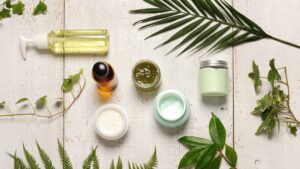
Ingredients such as rose-hip oil, vitamin B3, and green tea, for example, are used for anti-aging, Similarly, ingredients such as argan oil, feverfew, chamomile, and aloe are good for redness and inflammation. Hyperpigmentation can be taken care of by mulberry extract or with licorice, and acne by salicylic acid contained in black willow bark.
For some specific issues such as, to achieve impactful anti-aging (smoothening of skin with reduction of wrinkles, pigmentation and pores) we would need a chemically derived Vitamin A as there is no naturally produced retinoic acid.
Is sunscreen important?
A one hundred percent Yes.
Although the majority of Americans agree that protection from the sun is important, nearly half of them do not use sunscreen. In fact, a survey conducted by the American Academy of Dermatology shows that people believe that tanning has positive health benefits!
About 77% of the people who responded to the survey said they use sunscreen only while on a visit to a beach and do not think of using sunscreen while working in their yard or while gardening.
This is because many people do not take skin cancer seriously or may think they will not develop skin cancer, which is caused by direct exposure to the sun and its harmful ultraviolet rays.
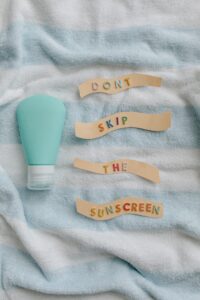
Individuals with lighter skin tones, green or blue eyes, and a family history of cancer are more prone to skin cancer due to sun exposure.
Exposure to the sun causes premature aging of our skin, skin discoloration, sunburns, and early wrinkling. The use of sunscreen becomes even more important to avoid damaging our skin and also prevent developing skin cancer.
On a concluding note…
You and your skin are important. Taking care of your wellness, diet, mental and physical health, your stress levels no matter who you are is of utmost importance as what we put into our bodies is what we get to see on the outside. If we are truly happy our skin glows you must have noticed, if you binge-eat oily food you break out with acne you might have noticed this too or you might experience other health-related issues that clearly show on your face as it is the mirror of yourself.
Go on and read that list of ingredients the next time you reach out for that tub of cream or facewash and now that you are educated on what is your skin type and what to look for and what to avoid, chuck that tub filled with harmful chemicals and reach out for the one that has all the goodies loaded in it. And, please do not get influenced by social media, you know what to do.
Sunscreen, yes please, no matter if you are working in your backyard or fetching groceries, put it on. It is not beach wear! to be worn only on a trip to the beach!
Do check out the skincare products that you can look for (after you determine your skin type and skin-related issues)
EltaMD Sunscreen Moisturizer Hyaluronic Hydrating
Burts Bees 174 Daily Moisturizer for Sensitive Skin